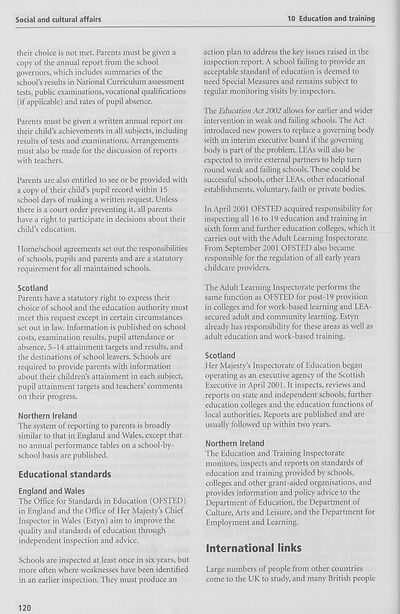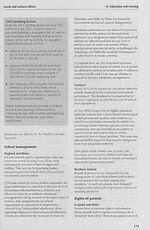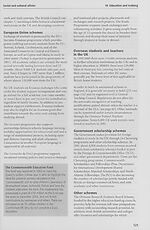Download files
Complete book:
Individual page:
Thumbnail gallery: Grid view | List view

Social and cultural affairs
10 Education and training
their choice is not met. Parents must be given a
copy of the annual report from the school
governors, which includes summaries of the
school’s results in National Curriculum assessment
tests, public examinations, vocational qualifications
(if applicable) and rates of pupil absence.
Parents must be given a written annual report on
their child’s achievements in all subjects, including
results of tests and examinations. Arrangements
must also be made for the discussion of reports
with teachers.
Parents are also entitled to see or be provided with
a copy of their child’s pupil record within 15
school days of making a written request. Unless
there is a court order preventing it, all parents
have a right to participate in decisions about their
child’s education.
Home/school agreements set out the responsibilities
of schools, pupils and parents and are a statutory
requirement for all maintained schools.
Scotland
Parents have a statutory right to express their
choice of school and the education authority must
meet this request except in certain circumstances
set out in law. Information is published on school
costs, examination results, pupil attendance or
absence, 5-14 attainment targets and results, and
the destinations of school leavers. Schools are
required to provide parents with information
about their children’s attainment in each subject,
pupil attainment targets and teachers’ comments
on their progress.
Northern Ireland
The system of reporting to parents is broadly
similar to that in England and Wales, except that
no annual performance tables on a school-by¬
school basis are published.
Educational standards
England and Wales
The Office for Standards in Education (OFSTED)
in England and the Office of Her Majesty’s Chief
Inspector in Wales (Estyn) aim to improve the
quality and standards of education through
independent inspection and advice.
Schools are inspected at least once in six years, but
more often where weaknesses have been identified
in an earlier inspection. They must produce an
action plan to address the key issues raised in the
inspection report. A school failing to provide an
acceptable standard of education is deemed to
need Special Measures and remains subject to
regular monitoring visits by inspectors.
The Education Act 2002 allows for earlier and wider
intervention in weak and failing schools. The Act
introduced new powers to replace a governing body
with an interim executive board if the governing
body is part of the problem. LEAs will also be
expected to invite external partners to help turn
round weak and failing schools. These could be
successful schools, other LEAs, other educational
establishments, voluntary, faith or private bodies.
In April 2001 OFSTED acquired responsibility for
inspecting all 16 to 19 education and training in
sixth form and further education colleges, which it
carries out with the Adult Learning Inspectorate.
From September 2001 OFSTED also became
responsible for the regulation of all early years
childcare providers.
The Adult Learning Inspectorate performs the
same function as OFSTED for post-19 provision
in colleges and for work-based learning and LEA-
secured adult and community learning. Estyn
already has responsibility for these areas as well as
adult education and work-based training.
Scotland
Her Majesty’s Inspectorate of Education began
operating as an executive agency of the Scottish
Executive in April 2001. It inspects, reviews and
reports on state and independent schools, further
education colleges and the education functions of
local authorities. Reports are published and are
usually followed up within two years.
Northern Ireland
The Education and Training Inspectorate
monitors, inspects and reports on standards of
education and training provided by schools,
colleges and other grant-aided organisations, and
provides information and policy advice to the
Department of Education, the Department of
Culture, Arts and Leisure, and the Department for
Employment and Learning.
International links
Large numbers of people from other countries
come to the UK to study, and many British people
120
10 Education and training
their choice is not met. Parents must be given a
copy of the annual report from the school
governors, which includes summaries of the
school’s results in National Curriculum assessment
tests, public examinations, vocational qualifications
(if applicable) and rates of pupil absence.
Parents must be given a written annual report on
their child’s achievements in all subjects, including
results of tests and examinations. Arrangements
must also be made for the discussion of reports
with teachers.
Parents are also entitled to see or be provided with
a copy of their child’s pupil record within 15
school days of making a written request. Unless
there is a court order preventing it, all parents
have a right to participate in decisions about their
child’s education.
Home/school agreements set out the responsibilities
of schools, pupils and parents and are a statutory
requirement for all maintained schools.
Scotland
Parents have a statutory right to express their
choice of school and the education authority must
meet this request except in certain circumstances
set out in law. Information is published on school
costs, examination results, pupil attendance or
absence, 5-14 attainment targets and results, and
the destinations of school leavers. Schools are
required to provide parents with information
about their children’s attainment in each subject,
pupil attainment targets and teachers’ comments
on their progress.
Northern Ireland
The system of reporting to parents is broadly
similar to that in England and Wales, except that
no annual performance tables on a school-by¬
school basis are published.
Educational standards
England and Wales
The Office for Standards in Education (OFSTED)
in England and the Office of Her Majesty’s Chief
Inspector in Wales (Estyn) aim to improve the
quality and standards of education through
independent inspection and advice.
Schools are inspected at least once in six years, but
more often where weaknesses have been identified
in an earlier inspection. They must produce an
action plan to address the key issues raised in the
inspection report. A school failing to provide an
acceptable standard of education is deemed to
need Special Measures and remains subject to
regular monitoring visits by inspectors.
The Education Act 2002 allows for earlier and wider
intervention in weak and failing schools. The Act
introduced new powers to replace a governing body
with an interim executive board if the governing
body is part of the problem. LEAs will also be
expected to invite external partners to help turn
round weak and failing schools. These could be
successful schools, other LEAs, other educational
establishments, voluntary, faith or private bodies.
In April 2001 OFSTED acquired responsibility for
inspecting all 16 to 19 education and training in
sixth form and further education colleges, which it
carries out with the Adult Learning Inspectorate.
From September 2001 OFSTED also became
responsible for the regulation of all early years
childcare providers.
The Adult Learning Inspectorate performs the
same function as OFSTED for post-19 provision
in colleges and for work-based learning and LEA-
secured adult and community learning. Estyn
already has responsibility for these areas as well as
adult education and work-based training.
Scotland
Her Majesty’s Inspectorate of Education began
operating as an executive agency of the Scottish
Executive in April 2001. It inspects, reviews and
reports on state and independent schools, further
education colleges and the education functions of
local authorities. Reports are published and are
usually followed up within two years.
Northern Ireland
The Education and Training Inspectorate
monitors, inspects and reports on standards of
education and training provided by schools,
colleges and other grant-aided organisations, and
provides information and policy advice to the
Department of Education, the Department of
Culture, Arts and Leisure, and the Department for
Employment and Learning.
International links
Large numbers of people from other countries
come to the UK to study, and many British people
120
Set display mode to:
![]() Universal Viewer |
Universal Viewer | ![]() Mirador |
Large image | Transcription
Mirador |
Large image | Transcription
The item on this page appears courtesy of Office for National Statistics and may be re-used under the Open Government Licence for Public Sector Information.
| Britain and UK handbooks > UK: The official yearbook of the United Kingdom of Great Britain and Northern Ireland > 2003 > (142) |
|---|
| Permanent URL | https://digital.nls.uk/204924953 |
|---|
| Attribution and copyright: |
|
|---|---|
| Description | Three volumes of 'UK: The official yearbook of the United Kingdom of Great Britain and Northern Ireland', published annually by the Office of National Statistics from 2002-2005. |
|---|---|
| Shelfmark | GII.11 SER |
| Description | Three titles produced by the British Government from 1954-2005 describing 'how Britain worked'. They are: 'Britain: An official handbook' (1954-1998), 'Britain: The official yearbook of the United Kingdom' (1999-2001), and 'UK: The official yearbook of the United Kingdom of Great Britain and Northern Ireland' (2002-2005). These 50 reports provide an overview of Britain's economic, social and cultural affairs, its environment, international relations, and the systems of government. They give an impartial summary of government policies and initiatives, and explain how public services are organised. |
|---|---|
| Additional NLS resources: |
|

